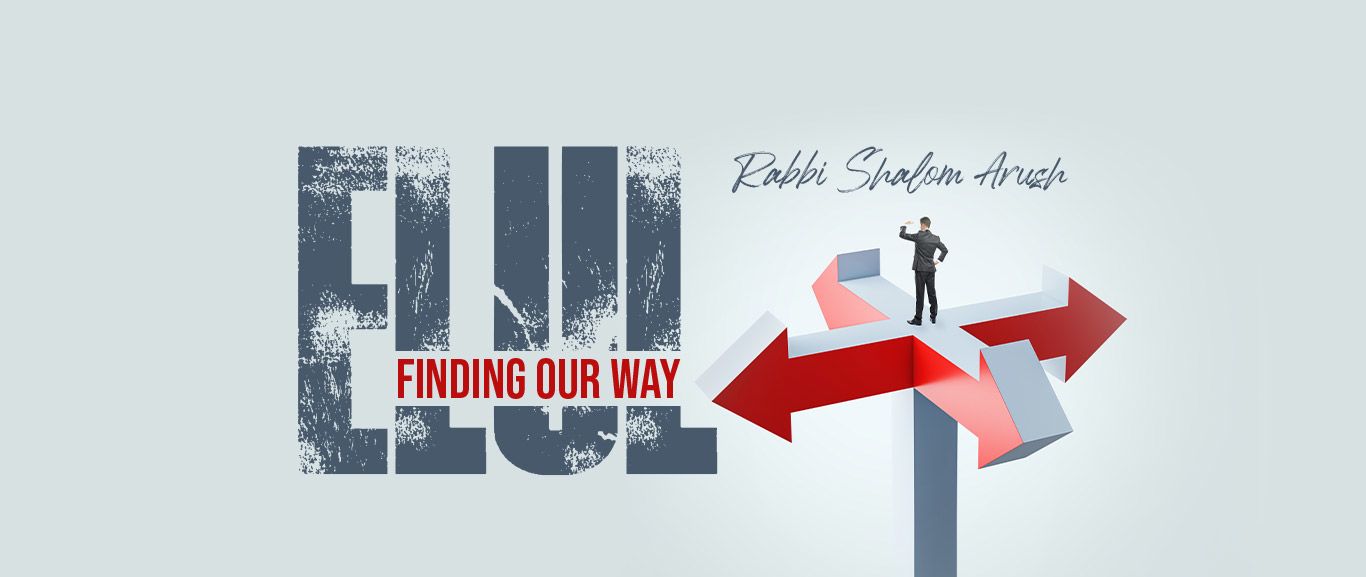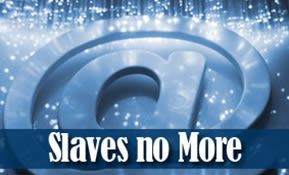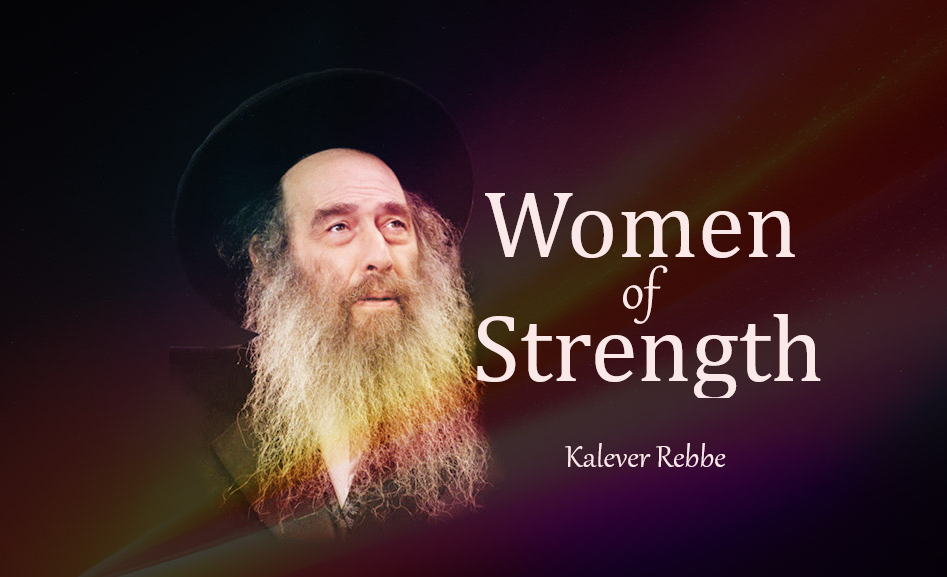
Elul: Finding Our Way
There's a basic law in navigation - you can't know where you're going until you know where you are. Most people have no idea where they are - they're lost in this world...

Translated by Rabbi Lazer Brody
Elul is the month of teshuva. Most people think that “teshuva” means penitence, but that’s not really accurate. Teshuva means “to return”, from the Hebrew word lashuv. So where are we trying to return to? To Hashem, of course. But, so many people are lost – they don’t know the way. Our job in Elul is to find our way back to Hashem. For that, we must learn spiritual navigation.
There’s a basic law in navigation – you can’t know where you’re going until you know where you are. Most people have no idea where they are – they’re lost in this world. That’s why they lack direction and waste their lives doing inconsequential things.
Let’s suppose that you do have a goal, that you do know where you want to go. If you don’t know where you are now, how can you know how to get there. For example, suppose you want to go to Chicago, but you have no idea where you are now. If you’re in Los Angeles, then you have to travel eastward to get to Chicago. And if  you’re in New York City, then you must travel westward to get there. So what happens if you don’t know where you are? You don’t know where to go!
you’re in New York City, then you must travel westward to get there. So what happens if you don’t know where you are? You don’t know where to go!
Hashem calls each one of us every single day – Ayeka, where are you? The same laws in physical navigation also apply to spiritual navigation. We can’t know where we’re going if we don’t know where we are. We can’t get close to Hashem if we don’t take an objective look at ourselves and know exactly where we’re holding. A person can’t simply say, “I know how to get to Hashem – I simply go up!” He won’t get closer to Hashem unless he first does what he needs to do at his current spiritual level. A person can’t wake up in the morning and decide that he’s Moses or Rebbe Akiva – it doesn’t work that way. Our ascent must be level by level, correcting and refining ourselves every step of the way. Just as a child can’t jump from the second grade of elementary school to Harvard Medical School, we’d be fantasying to think that we can pole-vault our way over spiritual steps to reach great heights. People who think that end up falling just like the pole vaulter – he doesn’t stay up high, because that’s not true ascent.
Let’s look where we really are now. We’re influenced by a generation that’s hit rock bottom. Every single day, you hear stories about how the web, social media, and chat rooms have brought out the ugliest of people. Who ever heard of such blatant cyber adultery, pedophiles, and other such filth? It breaks one’s heart to think that so many “observant” people squander hours in such spiritual mires, which is non other than the Evil Inclination’s quicksand that traps and buries a person alive. Everything revolves around lust and breach of holiness.
You can’t understand the rewards of guarding one’s personal holiness, especially in a generation where even rabbis fail to guard their eyes. That’s what it means to know where you are. Be honest with yourself and be honest with Hashem. Talk to Him like this: “OK, Hashem, I admit that my mind is full of lewd images and thoughts. I often forget to close my eyes and I end up seeing sights that destroy my soul, rob me of my personal holiness, and are therefore hateful to You. But, I want to be a shomer brit, Hashem; I want to be a guardian of personal holiness. I want to be able to get close to you. I want to be able to taste the true delight of Torah, of Shabbat, and of holiness. I’m sick of being a slave to my lusts and bodily urges. You have to help me, Hashem! You’re my Father in Heaven; I need Your help because I can’t do this on my own.”
You can’t imagine the immense gratification Hashem receives from a person who speaks to Hashem after candid self-evaluation. We shouldn’t budge from this type of daily personal prayer until every aspect of personal holiness is deeply ingrained within our hearts and minds. The important thing to know is where we’re truly holding. And, in all ethical honesty, we can only seek Hashem’s help in enhancing our personal holiness if we’re doing everything in our power to guard and preserve our personal holiness.
There’s an important point which is the beginning of every success, the best way to connect to Hashem. This is the foundation of one’s entire relationship with Hashem. Let me explain:
Parshat Bereishit explains that Adam and Eve transgressed Hashem’s commandment by eating from the Tree of Wisdom. The Torah then tells that after eating the forbidden fruit, they realized how terrible their transgression was. So what did they do? Inanely, they tried to hide from Hashem. Stop and think about this – isn’t it chutzpah? That’s really insolent, trying to hide from Hashem, Who is everywhere, all the time, omniscient and sees everything. Hashem also never forgets the tiniest detail of whatever happens anywhere. How can you hide from Hashem? Adam and Eve did.
Just imagine that your boys are playing hardball, and they knock the ball right through your $1,500 living-room window. Then they try to hide from you; that makes you even more furious. But, if your boys are good boys, and they admit their mistake, willing to pay for the damage by doing chores and paying with their allowance money and birthday money, your heart fills with mercy for them. They know they did wrong and they’re willing to rectify. What wonderful boys. You don’t punish such children; indeed, you love them even more.
Just imagine the grief that Adam and Eve would have spared both themselves and subsequent generations if they would have approached Hashem and admitted their mistake rather than trying to hide. So you sinned? Suffer a few moments of embarrassment and confess to Hashem! The embarrassment in itself is an atonement for the sin. But to try and hide from Hashem? That’s super chutzpah, outright insolence. Don’t you think that Hashem sees everything and knows everything? How can anyone hide from Hashem? Yet, we’re not talking about Adam and Eve – we’re talking about us, here 5778 years down the road. People hide behind their office door and text message to people they shouldn’t be texting. Or people think they’re alone at home and start gabbing in chat rooms, or Facebook, or even worse. Don’t you know that Hashem sees and hears your every thought, not only your every word. Thinking that you can hide from Hashem, or that Hashem doesn’t see you, is the biggest heresy and insolence on earth.
So how can a so-called religious person do the horrible things that we’ve been hearing about, completely trampling personal holiness? Their lust blinds them to the point where they can no longer see Hashem. When a person cuts himself off from personal holiness, he cuts himself off from Hashem, G-d forbid.
Hashem is still patient. He is still calling out daily to every one of us, “Ayeka, where are you?” Ayeka, when we take a good look at ourselves and ask ourselves where we are, this is the important point which we spoke about, the beginning of every success, and the best way to connect to Hashem. Ayeka, honestly assessing ourselves and knowing truly where we’re holding is the foundation of one’s entire relationship with Hashem. May we all succeed, amen.












2/08/2016
What do you do when you can’t find out if you are Jewish b/c adopted and Grandfather was Jewish.
Illinois law blocks me from the additional information I need. However, for my grandfather to be Jewish both of his parents had to have been. Life is made difficult by not knowing even who I am.
2/08/2016
Illinois law blocks me from the additional information I need. However, for my grandfather to be Jewish both of his parents had to have been. Life is made difficult by not knowing even who I am.